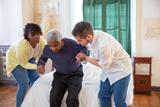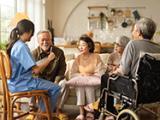Dos, Don’ts, and the Basics of Providing Care to Patients Experiencing Intimate Partner Violence

Joe Polich, MSW, LCSWA, JD will provide a foundational knowledge to providers who come in contact with patients with cancer who are also experiencing IPV. Beginning with a quick introduction to some basic concepts of the dynamics of IPV in general, we will discuss the intersection of the provision of care to a patient with cancer and the dynamics involved in IPV.
Category
- Patient Centered Care
Format
- Self-Paced, Online Courses
Credits
- 1.00 ACPE Pharmacist
- 1.00 ACPE Pharmacy Tech
- 1.00 ASRT
- 1.00 NCPD/CNE
- 1.00 Participation
Cancer Pathology: How Diagnosis Drives Treatment

Yuri Fedoriw, MD, provides a general background of cancer pathology and tissue diagnosis. The development of testing methods and their application will be discussed, as will the limitations and challenges of cancer classification.
Category
- Patient Centered Care
Format
- Self-Paced, Online Courses
Credits
- 1.00 ACPE Pharmacist
- 1.00 ACPE Pharmacy Tech
- 1.00 ASRT
- 1.00 CTR
- 1.00 NCPD/CNE
- 1.00 Participation
Where the Rubber Meets the Road: Community-Inclusive Interventions to Achieve Equity in Cancer Care - SPOC

Samuel Cykert, MD, and Christina Yongue, MPH, MCHES, describe the long-lasting racial disparities in breast and lung cancer care, and some of the root causes for these inequities. Participants will learn how a community-academic-medical partnership addressed these disparities by designing system-change interventions based on antiracism principles.
Category
- Patient Centered Care
Format
- Self-Paced, Online Courses
Credits
- 1.00 ACPE Pharmacist
- 1.00 ACPE Pharmacy Tech
- 1.00 ASRT
- 1.00 CTR
- 1.00 NCPD/CNE
- 1.00 Participation
Occupational Therapy and Cancer Rehabilitation

Farrell Wiggins MS, OTR/L, and Alexis Petteway, MS, OTR/L, provide insight into Occupational Therapy’s unique role in cancer rehabilitation. They explore the benefits of receiving OT in both the inpatient and outpatient settings. Importantly, they also discuss the how occupational therapists measure and address cancer and chemotherapy related symptoms and occupational challenges in cancer survivors.
Category
- Patient Centered Care
Format
- Self-Paced, Online Courses
Credits
- 1.00 ACPE Pharmacist
- 1.00 ACPE Pharmacy Tech
- 1.00 CTR
- 1.00 NCPD/CNE
- 1.00 Participation
Providing LGBTQ Friendly Care in Oncology

Patti Morfeld, RN, BSN, OCNm discusses how to provide patient centered care for LGBTQ patients and families from registration through diagnosis, treatment and survivorship.
Category
- Patient Centered Care
Format
- Self-Paced, Online Courses
Credits
- 1.00 ACPE Pharmacist
- 1.00 ACPE Pharmacy Tech
- 1.00 CTR
- 1.00 NCPD/CNE
- 1.00 Participation
Cancer Related Pain Management from a Palliative Care Perspective

Cindy Kelly, FNP-BC, ACHPN, and Vineeta Rao, PharmD, BCPS, review opioid and nonopioid treatment options for cancer-related pain. Their presentation addresses patients with cancer and substance use disorder and also cancer patients that are in remission, but who still present with persistent pain.
Category
- Patient Centered Care
Format
- Self-study / Enduring
Credits
- 1.00 ACPE Pharmacist
- 1.00 ACPE Pharmacy Tech
- 1.00 CTR
- 1.00 NCPD/CNE
- 1.00 Participation
Parenting with Cancer

Patients with cancer who have minor-age children at home face unique psychosocial challenges in coping with impact of their diagnosis, treatment, and prognosis. A parental cancer diagnosis threatens to disrupt family functioning, re-organize roles and responsibilities in the home, and negatively affect parenting self-efficacy. A parent’s ability to navigate these challenging times can have ramifications for years to come. The current webinar will provide an overview of the extent research in this field, offer strategies that providers can use to enhance the coping of parents with cancer, and describe a new clinic at UNC designed specifically to address the challenges facing this subset of the cancer population.
Category
- Advanced Practice Provider
Format
- Self-Paced, Online Courses
Credits
- 1.00 NCPD/CNE
- 1.00 Participation
What Is Cancer Rehabilitation and How Can it Help My Patients?

Sasha E. Knowlton, MD, presents an introduction to cancer rehabilitation, including details as to why function is important in cancer patients. Patients with cancer are living longer as a result of improved surveillance and treatment interventions. However, cancer survivors often develop functional impairments that can significantly affect their quality of life and independence. Dr. Knowlton will review common diagnoses and treatments in the field of cancer rehabilitation. She will also provide an overview of how cancer rehabilitation can help patients before and during treatment and into survivorship.
Category
- Advanced Practice Provider
Format
- Self-Paced, Online Courses
Credits
- 1.00 NCPD/CNE
- 1.00 Participation
Oral Chemotherapy: Prescribing, Monitoring, and Safety

Oral chemotherapy has shifted the care of oncology patients from infusion clinics to patients' homes. This shift in care requires healthcare providers to not only manage patients differently but for patients to take on additional responsibilities. Aimee Faso, PharmD, BCOP, CPP, addresses the issues related to the safe use of oral chemotherapy in oncology patients.
Category
- Advanced Practice Provider
Format
- Self-Paced, Online Courses
Credits
- 1.00 NCPD/CNE
- 1.00 Participation
The Value of Integrative Medicine in Oncology Care

Denise Spector, PhD, MPH, ANP, RYT, provides an overview of integrative oncology which includes evidence-based strategies for helping to mitigatecommon cancer symptoms and cancer treatment-related side effects, as well as strategies that may improve one's overall healthand well-being along the cancer care continuum.
Category
- Advanced Practice Provider
Format
- Self-Paced, Online Courses
Credits
- 1.00 NCPD/CNE
- 1.00 Participation

 Facebook
Facebook Twitter
Twitter LinkedIn
LinkedIn Forward
Forward